So often the story of the Russian Orthodox Church Outside of Russia is told in terms of the experiences, decisions, and actions of her clergy – and understandably so. However, the Church exists to serve to spiritual needs of its people and so often the focus on the clergy takes attention away from the experiences and pious labours of the laity. Most congregations comprise predominantly of women, yet so rarely do we hear of their experiences, decisions, and actions.
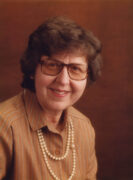 In many ways the history of the late Valentina Vasilievna exemplifies the history of the second emigration who belong to the Russian Orthodox Church Outside of Russia. Valentina never held any office in the parish; she never sought titles or power. However, she embodied all that it is good about a true Christian who sought all her life to be of service to others, both outside the Church and inside the Church. This is her story – a similar story could be told by countless other women who have been the bedrock of the scattered communities of the Russian Orthodox Church Outside of Russia.
In many ways the history of the late Valentina Vasilievna exemplifies the history of the second emigration who belong to the Russian Orthodox Church Outside of Russia. Valentina never held any office in the parish; she never sought titles or power. However, she embodied all that it is good about a true Christian who sought all her life to be of service to others, both outside the Church and inside the Church. This is her story – a similar story could be told by countless other women who have been the bedrock of the scattered communities of the Russian Orthodox Church Outside of Russia.
May Valentina rest in peace and rise in glory!
Valentina Vasilievna Turner-Udalcova was born on 4 February, 1930 in Riga. She was the only daughter of Vassily Alexievich Udalcovs and his wife, Anna Iosivovna Zile. Vassily Udalcovs had been born in 1888 to a quite wealthy merchant family, and, until the Russian Revolution, he had lived near Novgorod.

c. 1935: Valentina with her parents at Riga Zoo, accompanied by a chauffeur who had been hired for the day.
When the Bolsheviks came to power, Valentina’s father managed to escape and went to live in Riga where he eventually established a business which provided ice to restaurants. There he met and married Valentina’s mother, Anna, who had been born in Lithuania, at that time a part of Russia. However, in 1929 their business collapsed and a year later, the family, which included Anna’s mother, Josephine, moved to a small town, Abrene, [1]The present-day border town Pytalovo in Pskov region. Formerly in the territory of the Russian Empire, in 1920 it became part of the independent state of Latvia. After the Soviet occupation in 1940, … Continue reading at that time within the territory of Latvia on the border with the Soviet Union, about 300 kilometres from Riga and about 100 kilometres south-west of Pskov. In Abrene, Valentina’s mother became the manager of a restaurant, which was established in the largest house in Abrene, while Valentina’s father developed a business in the bottling and distribution of beer, and the grandmother took care of Valentina.
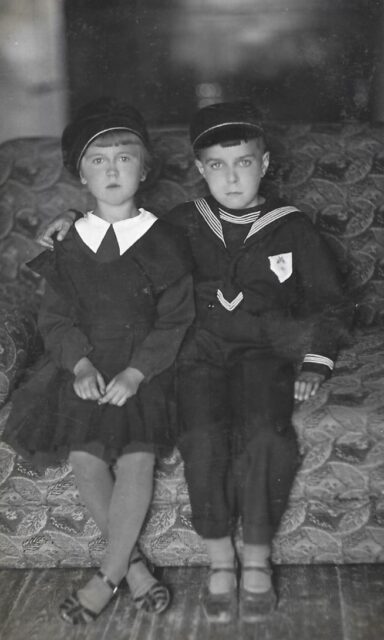
c. 1937, Abrene, Latvia: Valentina with Gleb Podmoshensky, who became Abbot Herman, founding abbot of the St Herman of Alaska Monastery in Platina, California, USA.
Most of the customers at Anna’s restaurant were border police who were obliged by Anna not to wear their guns while they were eating at Anna’s restaurant. Anna opened a second restaurant in Abrene and this one catered mainly to farmers who brought their goods to market.
At the age of nine months Valentina was baptised by Father Sergei Efimov, [2]Priest Sergei Efimov (1878-1967). He was born in Oranka (Nizhny Novgorod province) into a priest’s family. In 1900, he graduated from the seminary in St. Petersburg. From 1913 until 1917, Fr … Continue reading a priest of the Latvian Orthodox Church. Father Sergei was responsible for building the church of St Nicholas in Abrene which opened for worship in 1931.
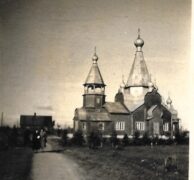
c. 1938: Saint Nicholas Church, Abrene, Latvia, the church where Valentina was baptised.
Father Sergei, an experienced missionary, later became a leader of the Pskov Orthodox Mission, an enterprise established in the Baltic region by Metropolitan Sergii (Voskresenskii) of Vilnius and Lithuania. Fr Sergei gleefully used to remind the young Valentina of how she tightly held onto his beard as he immersed her in the baptismal font. As Valentina grew up, she participated in Church life and sang in the choir. One of her playmates was Gleb Podmoshensky who would go on to become Father Herman, first abbot of the St Herman of Alaska Monastery in Platina, California. They remained firm friends until Father Herman’s repose in 2014. Indeed, even as an adult, Valentina always affectionately called him by his childhood familiar name, “Gulia.”
Life for Valentina, her parents and grandmother was not easy but it was peaceful. All that changed dramatically in June, 1940 when the Soviets annexed Latvia and the Soviet army arrived in Abrene. Valentina’s father was arrested and imprisoned. Valentina, her mother and grandmother, banned from Abrene, were ordered to live at least three kilometres away from the town. Some weeks later Vassily was released without charge and the family, still living outside Abrene, continued their catering business. Now their customers were chiefly officers of the Soviet NKVD, the secret police organisation which was infamous for its political repression. In April, 1941, Vassily was arrested again and sent to a prison at Ostrov, some 50 kilometres away (together with Father Sergei Efimov). Again, Anna and Valentina were homeless but managed to find lodgings with a pious farmer called Alexander. Then, in July, 1941, the German army released all the political prisoners including Vassily and Fr. Sergei. Vassily once again joined his family in Abrene where they were able to recover their property where their furniture was still in place. Valentina and her family were able to return for a short while to a more normal way of life. However, there remained the continual fear that the Soviets would return and living by the Soviet-Latvian border was a constant reminder of that threat. Early in 1944, Valentina’s parents went to live in in Riga.
On 29 April, 1944, the 14-years old Valentina was on her way to school and made her habitual visit to the cathedral to light a candle. As she entered the cathedral, a shocked priest emerged from the altar and announced to the people that the Exarch of the Russian Orthodox Church in the Baltic territories, Metropolitan Sergii (Voskresenskii), had been assassinated, [3]At the time both the German and Soviet authorities blamed each other for the assassination, and the matter has remained unclear, although modern scholars tend to the view that it was the Nazis who … Continue reading and the priest immediately served a panikhida for the slain Metropolitan. A few days later, Valentina was present at the funeral and burial of the Exarch, an event that left a deep impression on the young Valentina.
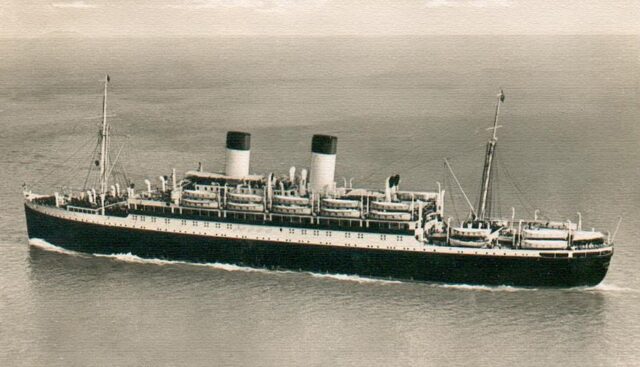
c. 1940: M.V. Monte Rosa, the German ship which took Valentina and her family from Riga to Danzig in Germany (now Gdańsk in Poland). After WWII the ship became H.M.T. Empire Windrush which famously brought immigrants from the West Indies to the UK.
As it became certain that the Soviets would return to Latvia imminently, thousands of people began to leave Latvia, mostly by ship. The Germans allowed this exodus to take place and on 4 October, 1944, Valentina, together with her mother and grandmother, took passage on a German ship, the Monte Rosa, [4]MV Monte Rosa was a passenger liner and cruise ship launched in Germany in 1930. During World War II, she was operated by the German navy as a troopship. She was acquired by the United Kingdom as a … Continue reading which took the refugees to Danzig (now Gdansk in Poland). Danzig was subject to continual bombings by the Allied forces and very soon after disembarking, Valentina, her mother and her grandmother were sent to a refugee camp near Münster, a city in north-west Germany. On the 25 October, 1944, there was yet another Allied bombing raid on northern Germany. The American planes were flying so low that they could see that they were over a vast refugee camp (which did not have any bomb shelters), yet they continued to drop their bombs. Valentina and her mother and grandmother lived in a small room which housed 16 people altogether. By some strange turn of fate, Valentina exchanged places with her mother and, at that same moment, a piece of shrapnel hit the very place where now her mother sat. Anna’s left arm was shattered. Had Valentina stayed put, she probably would have been killed. What remained of Anna’s left arm was amputated without benefit of anæsthetic. Soon after this traumatic event, Valentina’s father arrived in Danzig from Latvia. Despite the chaos of war and a flood some four million displaced persons, German efficiency came to the fore. From their meticulous record keeping, without difficulty the German authorities were able to inform Vassily of exactly the location of his family.
Soon after arriving at the refugee camp near Münster, the family were sent by the German authorities on a train to a village near Schwerin in the State of Mecklenburg. There Valentina, 14 years old, was taken into service by a wealthy German family who owned a successful flour-milling business. Fiercely anti-Nazi, the German family were good to Valentina whose responsibilities included the welfare of their three young children, serving meals, and feeding the turkeys. Valentina had living accommodation with the family, and each week was allowed to have one half day off, when she cycled the three kilometres to visit her mother and father. In May, 1945, the Americans liberated Schwerin from the Nazis, which led to great happiness among the Russian refugees. One month later, the young Valentina answered a knock at the door of her employer’s family home to be confronted by the sight of a Soviet solder standing there. Without a word, she bolted through the house, into the back garden, jumped on her bicycle and fled to warn her parents of the disaster: the Americans had handed the territory over to the Soviets. Now Schwerin was in what was to become the German Democratic Republic (East Germany). In fact, the advance Soviet troops left the Russian refugees alone. However, they were replaced by another wing of the Soviet army, which set about forcibly deporting the Russian refugees. Valentina, her mother, father and grandmother, were put on a train to take them back to the Soviet Union (and undoubtedly to repression). However, when the train reached Schwerin, it stopped. Noticing that there the guards were absent, the family escaped from the train. They remembered that in Riga they used to be friendly with a German family called Rosenthal who, at the beginning of the War, had moved to Schwerin. [5] Almost certainly forced to leave Latvia under the terms of the German-Soviet treaty of 1939, known as the Molotov–Ribbentrop Pact. They looked for and found the Rosenthal family who willingly gave shelter to their old friends from Riga.
Deciding to stay put in Schwerin for a while, Valentina obtained work as a waitress at the Soviet officer’s dining room, while her father worked at the famous Schwerin Castle. In particular, Valentina had to wait on somebody she had been told was the Head of the Soviet Air Force in Germany, who stayed in Schwerin while conducting negotiations with the Allied Forces in Berlin. He was particularly unpleasant and offensive towards the 16-year-old Valentina. His adjutant was his nephew, Nikolai, who fell in love with Valentina and begged her to return to Moscow with him so that they could marry. Of course, she refused. Another suitor was a survivor of the battle of Stalingrad (1942-43), a Soviet Army sergeant called Oleg who was ten years older than Valentina. In his anger at Valentina’s refusal to marry him, Oleg violently assaulted Valentina. Then, Oleg was demobbed. He was supposed to return to the Soviet Union but, weeks later, on 20 September, 1946, he returned to Schwerin, went to Valentina’s home and attempted to shoot her dead. Mercifully, he missed and then fatally shot himself. With nobody else to take care of Oleg’s body, it was Anna and the 16-year-old Valentina that washed his body, placed him in a coffin and had him buried in Schwerin.
If they remained in Schwerin, however, the family knew that they would remain in danger of arrest and deportation. They determined to go west to the English zone. Late in September, 1946, the family paid a Polish man to ferry them at night across a lake, from where they would make their way on foot at night to the English zone. After landing, they walked for hours through a forest, not having any idea where they were or in which direction they should go. In the early hours of the morning, they came across a man with a horse and cart. Anna’s mother could speak German and she asked the man where they were. He told her that they were in the English Zone, and that he would take them, first to his home, and then to the nearby town of Ratzeburg. On the way, Valentina and her family began to speak to each other in Russian. Then the driver spoke to them in Russian. It turned out that the man in the forest that they had come upon quite accidentally was also Russian but from the first emigration; [6] i.e., he had gone into exile from Russia after 1917. indeed, he had a daughter living in London. In Ratzeburg, it was Sue Ryder who gave shelter to Valentina and her family. Sue Ryder, the future Baroness Ryder of Warsaw and Cheshire, had been a British volunteer with the Special Operations Executive in the Second World War, and, in peacetime, led many charitable organisations, notably the charity named in her honour. From Ratzeburg, Valentina was sent to a camp for displaced persons at Lübeck, one of the major ports of northern Germany.

c. 1945: A DP camp at Lübeck, Germany, where from 1946 Valentina and her family lived while waiting for permission to go to England.
At that time some 10,000 DPs lived in the five DP camps of Lübeck. People coming from Latvia were assigned to the ‘Riga’ camp. There Valentina learned that the British were sending displaced persons to Great Britain to work, due to the shortage of labour that resulted from the upheavals of World War II. Aged 16, Valentina was not old enough to be considered, so she forged her passport. Thinking that she was 18, the British ordered Valentina to join a boatload of refugees which was destined for the United Kingdom. Leaving her parents and grandmother in the camp at Lübeck, and with not a word of English, in December, 1946, Valentina disembarked at Harwich. Valentina was sent at first to London, then to Bristol, and then to Stroud in Gloucestershire, where for two years she worked in a hospital, in effect as a domestic servant. It would be another five years before her family would be able to leave Germany and live with Valentina in England.
In 1948, Valentina was allowed to choose where to live and she moved to London. She started working at a north east London hospital, known today as St. Anne’s. She quickly progressed to become a nursing auxiliary. In 1949, Valentina married an Englishman, Nelson Turner, usually called ‘George’. In 1951, Valentina gave birth to their only child, Corinne. Unfortunately, the marriage was not happy and in 1956 the couple divorced. Now Valentina was the sole breadwinner for her mother, her father, her grandmother, and her daughter.
After more than 20 years in nursing, Valentina changed career and went to work as a waitress, first at the famous Lyon’s Corner House in the Strand, and then at Selfridge’s in Oxford Street. In 1974, Valentina returned to nursing, this time at Whipp’s Cross Hospital, which was a two-minute walk from her home, a semi-detached house which Valentina managed to purchase in 1956. Valentina retired in 1994. In 2018 she moved to a smaller apartment in nearby Wanstead, east London.
Valentina’s grandmother, Josephine, had passed away in 1955. Valentina’s father, Vassily Alexievich, died in 1973 at the age of 85. After arriving in London from Germany, Vassily became a very active member of the London parish of what was then called the Russian Orthodox Church in Exile, now the Russian Orthodox Church Outside of Russia. He was a devoted supporter of Abbess Elizabeth (Ampenoff) and the nuns who, at the behest of Archbishop John (Maximovitch), had arrived from Palestine in London in 1954. Vassily Alexievich helped the sisters to establish their convent in north London. Valentina’s mother, Anna, wryly called her husband ‘the Thirteenth Apostle’ because he devoted so much of his time and meagre resources to helping the nuns and their chaplain, Archpriest George Cheremetieff (d. 1971). Valentina’s mother, Anna, died in 1999. Vassily and Anna are buried in Gunnersbury Cemetery in west London.
Despite her adventurous and, at times, terrible life, Valentina always maintained a strong faith and a love for the Russian Orthodox Church. Even in the refugee camps, she and her family were active participants in Orthodox worship in makeshift and temporary house churches. On moving to London in 1948, Valentina did not forget her faith but getting to church was difficult: she was doing shift work (often working on a Sunday) which was physically exhausting, and four other people were dependent upon her. However, as time went by, Valentina was able to become more and more involved in London parish life. At the old cathedral in Emperor’s Gate, London SW7, Valentina became an integral part of the Sisterhood of Saint Xenia, and gave much time to parish life, especially in shopping for food and in cooking. She helped out at the twice-yearly fundraising events which, at that time, were held at Chelsea Town Hall in the Kings Road, London SW1. In Cheesefare week Valentina often made hundreds and hundreds of blinis!
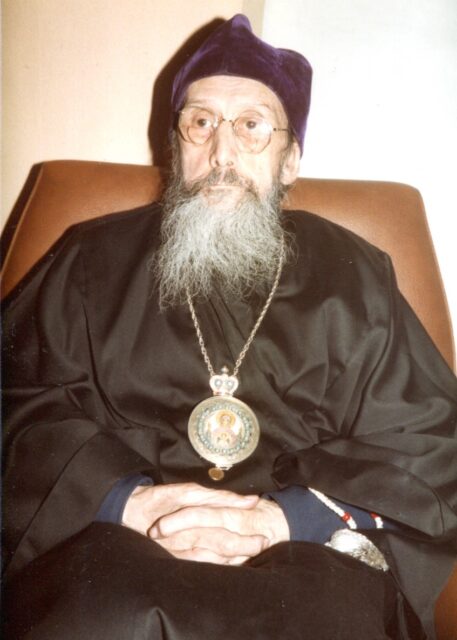
1983: Fulready Road, London E11. This photograph of Bishop Constantine (Jessensky) was taken when Vladyka Constantine visited Valentina in her home.
Then in 1981, Bishop Constantine (Jessensky, d. 1996) was appointed to the diocese of Richmond and Great Britain. From 1981 until his retirement in 1986 (when he returned to the USA), Valentina in effect became his keleinik (personal assistant), looking after his shopping, cooking, cleaning, etc. despite living some 15 miles from the bishop’s residence, holding down a full-time job, and looking after her family.
With the imminent collapse of communism and the atheistic Soviet state after 1988, Valentina desired to visit Latvia again and in August, 1991 she flew to Riga via Moscow, landing in Moscow on 19th August – the very day of the August coup. From then onwards, Valentina visited Riga on a regular basis. In 2001, she bought an apartment near Riga, subsequently selling it in 2011. While in Riga, Valentina was able to re-establish acquaintance with some childhood friends and their families. She also became a good friend of Bishop Aleksandrs (Kudrjašovs), now Metropolitan of Riga and all Latvia. Indeed, in 1994 the Metropolitan, together with Subdeacon Alexander Matryonin (the future Bishop of Daugavpils and Rezekne) visited London and stayed with Valentina at her home in Leyton, north-east London.
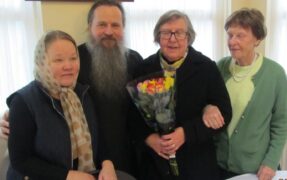
2014: On the feast of Saint Valentina (10/23 February) at the London ROCOR Cathedral, Harvard Road. With Choir Director, Matushka Antonina Vilgerts (l.), Archpriest Vladimir Vilgerts and Valentina Boeke-Rosanow (r.).
From 2010 to 2016 the parish was led by the Deputy Rector, Archpriest Vladimir Vilgerts who energetically helped the rapidly growing parish to develop, both spiritually and materially. Valentina was particularly happy because Fr Vladimir hailed from Latvia, and Valentina was able to exchange many memories and experiences with Fr Vladimir and his wife, Matushka Antonina (who was the Cathedral Choir Director).
Along with the majority of parishioners, Valentina was devastated when in 2016 Archbishop Mark endorsed the departure of Fr Vladimir and Matushka, who returned to Latvia.
In the same year Valentina decided to sell the house where she had lived for some fifty years in Leytonstone, London E10, and move to a small retirement apartment in nearby Wanstead, London E11. Her move was marred by a diagnosis of breast cancer. Valentina’s remaining years became a struggle to survive successive and more invasive treatments, and, from 2020 onwards, lockdowns and other restrictions caused by the Covid-19 pandemic. During this increasingly burdensome period, Valentina was supported throughout by good friends, including Lilia, Marina, and Susan, and, of course, Corinne.
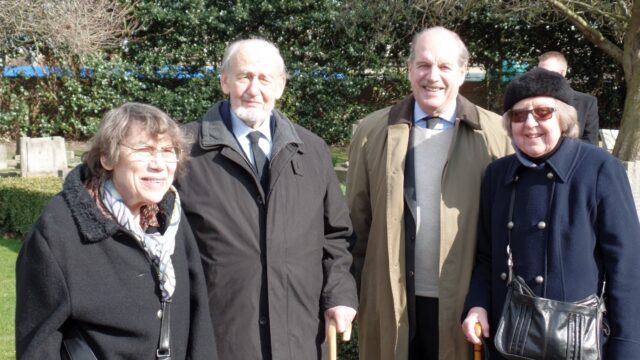
2015: At the funeral of George Vladimirovich Volossevich, Gunnersbury Cemetery, west London.
(l.-r.) Former Starosta, Sophia Vladimirovna Goodman, Subdeacon Prince Dmitri Nicholaevich Galitzine, Senior Trustee Gregory Alexandrovich Wolcough, and Valentina Vasilievna.
Always a generous supporter of the London Cathedral Parish, in 2018 Valentina donated £50,000 so that the perimeter wall of the Cathedral grounds could be completed, ahead of the Cathedral consecration in September, 2018.
In her last days Valentina suffered greatly but she was supported heroically and lovingly by Corinne. On Monday, 18 July, Archpriest Vitaly Serapinas, Deputy Rector of the London Cathedral, visited Valentina for the last time and administered to her the Holy Unction and Holy Gifts. And so it happened, that on Wednesday, 20 July, 2022, the servant-of-God Valentina reposed in the Lord. The funeral took place at the ROCOR London Cathedral in Harvard Road, London W4 on 15 August, served by His Grace Bishop Irenei, Archpriest Vitaly Serapinas, and Archpriest Yaroslav Hudymenko, supported by the Cathedral choir, and attended by a host of family, friends, Cathedral Sisters and other parishioners. The burial followed immediately at Gunnersbury Cemetery, London W4 where Valentina was laid to rest alongside her beloved father and mother. The clergy and people returned to the Cathedral Hall where the Sisterhood of Saint Xenia (at their own expense – a heartfelt tribute to their dear departed sister) had prepared an abundant Lenten memorial meal for some forty guests, who shared fond memories of their beloved Valentina. The fortieth day, marking the repose of Valentina, occurred on Sunday, 15/28 August, the Feast of the Dormition of the Most Holy Mother of God. [7]Until 2018 the London Cathedral Parish of the Russian Orthodox Church in Exile was dedicated to the feast of the Falling Asleep of the Mother of God (Uspenia), as had been the Russian Church … Continue reading On the preceding day (the Forefeast) family and friends gathered at the Cathedral for the 40th day pannikhida.
Condolences were received from far and wide including His Eminence, Metropolitan Alexander of Riga and All Latvia. Words of comfort received from Archpriest Vladimir Vilgerts in Latvia might be echoed by all who knew Valentina Vasilievna:
May the Heavenly Kingdom be granted to our dear Valentina Vasilievna. I am grateful to the Lord for the joy of being in communion with a worthy Christian and fellow compatriot. I will continue to pray for her, hoping for her prayers for me at the Throne of God.
All of us who knew Valentina will readily acknowledge that to be able to call her a friend was a privilege.
Valentina Vasilievna is survived by her daughter Corinne, grandchildren Mark and Hannah, and great-grandchildren, Ava, Lily and Olivia.
To the servant of God, Valentina – memory eternal and eternal rest!
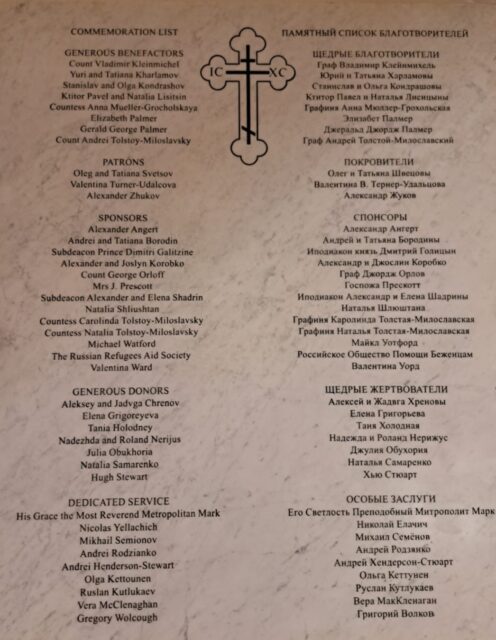
2023: Marble memorial at the London ROCOR Cathedral, listing the names of major contributors to the building of the Cathedral, which includes the name of Valentina Turner-Udalcova (Patron). Valentina would have been completely astonished to see her name among the ‘great and the good.’
References
| ↵1 | The present-day border town Pytalovo in Pskov region. Formerly in the territory of the Russian Empire, in 1920 it became part of the independent state of Latvia. After the Soviet occupation in 1940, Abrene was incorporated into the territory of the Russian Federation and when the former Soviet Republic of Latvia regained its independence in 1991, Abrene remained within the Russian Federation. |
|---|---|
| ↵2 | Priest Sergei Efimov (1878-1967). He was born in Oranka (Nizhny Novgorod province) into a priest’s family. In 1900, he graduated from the seminary in St. Petersburg. From 1913 until 1917, Fr Sergei served in the Pskov diocese as the diocesan missionary. After 1920, Fr Sergei served in the Latvian Orthodox Church in Jelgava, Vecslabada, and Abrene. On 23 June, 1941 Fr Sergei was arrested by the NKVD but subsequently released from prison by the German army. From August to November, 1941, he was the head of the Pskov Orthodox Mission. From April, 1942 Fr Sergei served in Riga. In January, 1945 in Abrene Fr Sergei was arrested once again by the Soviets and condemned to imprisonment for 10 years. After release in 1955, Fr Sergei served in the churches of Latvia. (Санкт-Петербургские епархиальные ведомости, 26-27 [2002]. Духовенство псковской миссии (Штрихи к биографиям). 46.) |
| ↵3 | At the time both the German and Soviet authorities blamed each other for the assassination, and the matter has remained unclear, although modern scholars tend to the view that it was the Nazis who murdered Metropolitan Sergii (Voskresenskii). |
| ↵4 | MV Monte Rosa was a passenger liner and cruise ship launched in Germany in 1930. During World War II, she was operated by the German navy as a troopship. She was acquired by the United Kingdom as a prize of war at the end of the war and renamed Empire Windrush. Today Empire Windrush is best remembered in the UK for bringing one of the first large groups of West Indian immigrants to the United Kingdom in 1948. |
| ↵5 | Almost certainly forced to leave Latvia under the terms of the German-Soviet treaty of 1939, known as the Molotov–Ribbentrop Pact. |
| ↵6 | i.e., he had gone into exile from Russia after 1917. |
| ↵7 | Until 2018 the London Cathedral Parish of the Russian Orthodox Church in Exile was dedicated to the feast of the Falling Asleep of the Mother of God (Uspenia), as had been the Russian Church community in London since 1713. |

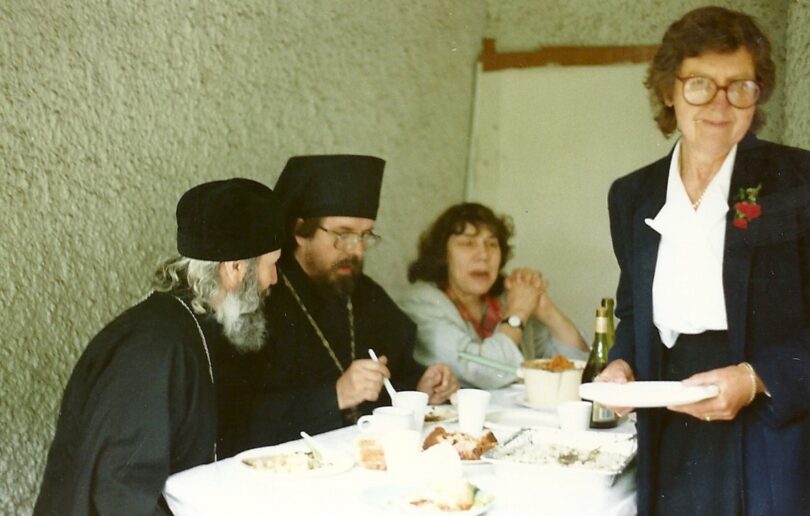










I met Bishop Constantin Essensky 1982. Now I am monk of the True Orthodox Church of Greece (of Archbishop Matthew Karpathakis (1861-1950).
Vechnaya Pamnyat Valentina! With the Saints give rest. Thank you Father Deacon Andrei in giving this biography of Valentina. While these are known facts, the narrative of Riga, Latvia speaks of the blessings of the Miracle-Working Ikon of the Mother of God of Tikhvin in which we have shared. It also gives a skeletal framework to those interested in historic truth of the many sacrifices and challenges women had to undergo in these times of war, violence and cultural upheaval, not of their making. It is also astounding that Valentina arrived in Moscow on August 19, 1991 at this time of political change. People outside of not knowing Orthodox Christian Feast Days unaware of the “Change” on the transformative day of “The Holy Transfiguration of Christ on Mount Tabor” to reveal his glory and the way in which Feasts of the Russian Orthodox Church were used as varying ‘signs and signals’ to carry out intelligence operations from similar ‘nurses and waitresses’ patriotic to witnessing for Christ and trained as ‘Christian Soldiers” and confirmed in their pursuits to be life-time advocates because God had spared them in this or that circumstance and the Mother of God was near and dear to their daily prayers and they had a heightened awareness of intercessory aid.
In response to the appeal for your family Father Deacon Andrei, if this article can bring awareness to a painting I own of Igor Sinyavin, non considered to be a “nonconformist Soviet” artist I am willing to ask you help in finding it a good home with a donor that has a heart like Valentina that you described and wants to aid your family and our monastery that has 48 hours to have $100,000 or some part of it and promise to gather loan monies so we can confirm that contract we made for land and a home adjacent to the St. Joseph Carmelite Monastery in Bunnell, Florida. This land contract is in the historic area of what is called “Korona” for Mary’s Crown, and is owned by Poland. Strengthen in prayer our historic ties and what can be now and the days to come with the educational and spiritual supports we can build on when we are in a location to be found and identified for our purpose of prayer together and education, we make this offer of ha;f the value of what this painting can be sold for. . . In this week, when I on the day I went to get help to pay my water bill from the St. Vincent de Paul Charity, the painting resting on the floor moved itself out from the wall about 4 inches!!!! I am not with the contacts you might have and wish to donate to your family need, aid your son in his music pursuits and to the very timely support we need NOW for our purchase contract and fulfillment of a closing day on January 31 to be honored or respectfully given a short term postponement until funds arrive. . . I can send you a photo of the painting that is representational to what artist this NON-CONFIRMIST branded Igor Sinyavin had in mind for a spiritual revelation given him by God in reference to Russia and Ukraine. . .The painting entitled “Yellow and Black” is the prototype of the multi-colored “Triptych” shown in the this referenced url. Igor’s wife, Tatyana Sinyavina is my close friend from ‘camp’ and through our friendship there with her and her 2 children became the bridesmaid holder of the crown over my head in my marriage of 7-13-1980, and we were given this gift from iconic work of art as the wedding resent. This land and home purchase is in hopes that now as a women monastic in the ROCOR from 11/21-22/2015 I can offer to God the various ‘golden threads’ given me in my lifetime to weave a lasting Sacred site for a monastery and educational friendly to all people site where Music and the Sacred Arts are respected as given us from God to share His love. (side note of HIS STORY God’s Story as our spiritual father Archimandrite Roman Braga would always say of how are to conduct ourselves in education and for the very cause of his 20 some years in the Gulag of Romania as a His Story teacher. We are happy for $2 to defeat the demons and to share this need so we can answer for our contract deadline this Monday, January 30, 2023. The exhibition of this historic work of Igor Sinyavin artist would be another way to help and to use to aid Fr. Deacon Adrei and his family and the many now displaced families in this so terrible of a war. Mother Elizabeth Klipa-Bacha, Holy St. Sava Apostle and Peacemaker pray to God for us, NewTikhvin Skete of the Holy Mother of God, ROCOR in, Palm Coast, Florida and Christmas Monastery School of Music and the Sacred and Creative Arts our Outreach Ministry in need of a sacred land, forever home in a safe accessible and findable location in Flagler County that has no Russian Orthodox Church permanent building. https://gofund.me/c1769385
https://en.wikipedia.org/wiki/Igor_Sinyavin#Nonconformist_Art_and_Prosecution
https://dbpedia.org/page/Bulldozer_Exhibition
I didn’t post any appeals for my family.